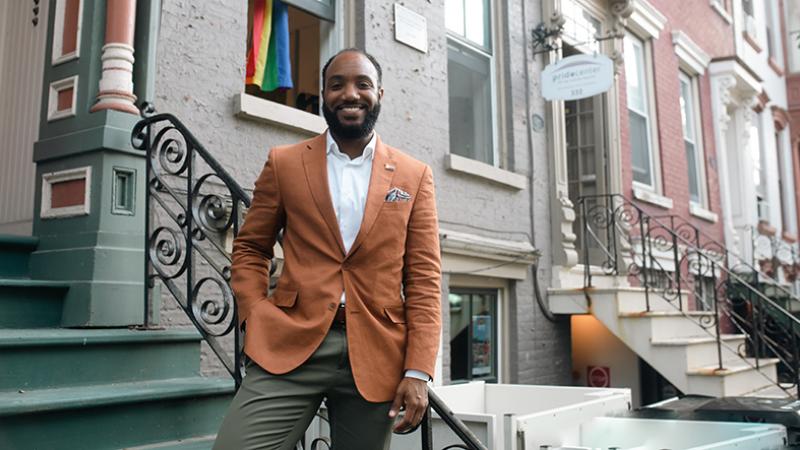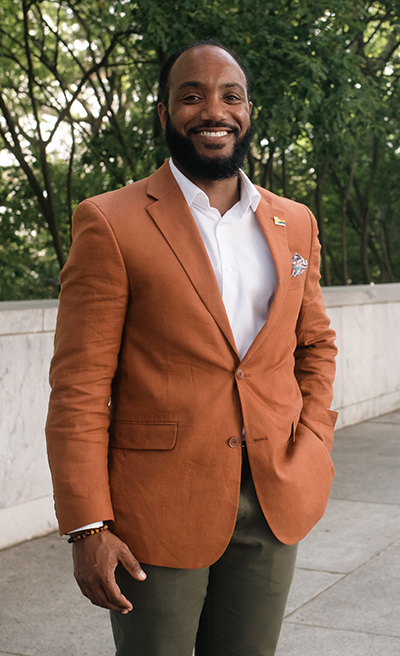
A Champion for Affirming, Culturally Responsive Health Care
The Zoom room got quiet as Tyson Pankey, PhD, MPH, took a deep breath, shared his slides, and began to tell his story to a group of residents, residency program leaders, and faculty members. Over the next 30 minutes, he peered into the web camera and laid bare a few of the personal identities that have helped shape his sense of self and guide his life’s journey.
Pankey, the associate program director for diversity, equity, and inclusion for education programs in the Department of Psychiatry & Behavioral Sciences, had sat in on several of these “Identity Conversations,” but this was his first time in the spotlight. The series, introduced in 2021 by psychiatry residency program director Heather Vestal, MD, MHS, fosters vulnerability and connection by giving both faculty and residents a safe space to explore and give voice to their unique lived experiences.
During that spring Zoom session, Pankey talked about one of his visible identities — being Black — and two of his identities that are invisible to many: being the youngest of three children and being a trans man. He was heartened by the warm and encouraging responses he received from the residents and his faculty colleagues. His experience supported his belief that these kinds of opportunities for authentic sharing and disclosure can truly help us develop self-awareness, cultivate compassion, and build meaningful relationships with each other.
“Being able to share a few of my identities with my community was really scary, but really empowering, healing, and growth-promoting,” Pankey said. “Most of us have been socialized to keep these things to ourselves. We’re modeling a new culture of medicine that reduces shame and invisibility of our own cultural identities.”
These conversations are particularly relevant, he says, for clinical providers in psychiatry and behavioral health, who engage with patients around deeply personal issues every day. “If I’m not willing to open up and talk about very difficult topics in an appropriate space, how can I ask my patients to do that?” Pankey said. “And having experiences like this also helps me think about how to create a safe space that allows for someone to share without feeling shame or stigma.”
Understanding intersecting cultural identities — and providing care that respects and affirms those identities — is at the heart of Pankey’s work as a clinician, educator, and researcher.
A Predictable Path

Pankey joined the Psychiatry & Behavioral Sciences faculty as an assistant professor in September 2021, after completing a post-doctoral fellowship at the Mayo Clinic in Rochester, Minnesota, where he specialized in transgender and intersex health and family medicine residency education. Prior to his fellowship, he earned a bachelor’s degree at the University of North Carolina at Chapel Hill, a master’s degree in public health at the University of Kansas School of Medicine and Public Health, and a doctoral degree in counseling psychology at the University of Wisconsin-Madison.
He notes that, as a naturally observant youth with parents who modeled culturally responsive professionalism, it’s no surprise he’s a fierce advocate for culturally responsive behavioral health care.
Growing up in both Towson, Maryland, and Olathe, Kansas, Pankey described taking in a lot of data about differences in how people treated one another, including him. He recalled, “It never quite made sense to me why skin color or any other characteristic would be a reason to treat people so differently—with ‘differently’ often times being a bad thing, in my observations.”
Pankey also grew up learning first-hand about “meeting people where they are” and attending to equity from his father, a retired pediatrician who provided care to underserved patient populations, and his mother, a retired elementary school teacher. Their approaches to their professions made a significant impact on him, both personally and professionally.
“My dad taught us a lot about thinking creatively about how to help people in ways that take into account their lived circumstances — really listening to patients, learning about their lives and cultural backgrounds, and then co-creating a plan that actually makes sense and works for them,” he said, noting that he takes a similar approach with his patients, many of whom are LGBTQ+ individuals.
And he remembers his mother always being intentional about fostering community in her classrooms and making sure that each student felt their uniqueness and contributions were valued. Pankey, too, is an educator at heart. He’s passionate about enhancing trainees’ awareness of underserved patient populations and the structural forces that underlie the health disparities that exist among these groups. He looks for ways to translate current research into action steps and behaviors that trainees can immediately integrate into their clinical practice to optimize the health of their patients of all backgrounds.
In his research, Pankey focuses on improving systems and advancing best practices that enhance care for all patients, including those in the LGBTQ+ community, who are often at greater risk for poor health outcomes due to factors such as bias, discrimination, and social rejection.
A Strengths-Based Perspective
Pankey wants to help flip the script on how health care providers talk about and care for people in the LGBTQ+ community. A growing body of research, including some of his own, shows that affirming health care practices — those that help LGBTQ+ people feel positively about themselves — are essential to optimizing health and well-being, particularly among those who experience marginalization.

Examples of these practices include using patients’ affirmed names and pronouns; displaying welcoming LGBTQ+ signage throughout the health care setting; and including fields in electronic medical records for gender identity, sexual orientation, affirmed pronouns, chosen name, and an organ inventory. Pankey looks forward to contributing to these efforts at Duke, including collaborating with the Duke Cancer Center to develop more affirming elements within the electronic medical record system for LGBTQ+ cancer patients.
“I believe people are incredibly resilient and resourceful, and they’re just looking to be supported, so my role is to provide support and guidance,” said Pankey. This strengths-based mindset, he says, contrasts with an all-too-common deficit-based or pathologizing perspective, in which mental health providers erroneously assume that LGBTQ+ individuals and communities are naturally susceptible to mental and behavioral health problems simply because of their identities. He highlights how harmful perspectives can cause clinicians to overly focus on “fixing” or judging LGBTQ+ patients, rather than meaningfully helping them to navigate their lives more freely and proudly.
He calls for continued research to identify specific factors that promote well-being and resilience within LGBTQ+ individuals and communities, particularly among those with multiple intersecting identities (e.g., LGBTQ+ people of color, LGBTQ+ people living with a disability). He explains that this research is critical for the development and implementation of more resilience-promoting experiences and interventions at the individual and community level. He adds, “I think this type of research will also help to shift the broader cultural narrative around LGBTQ+ persons.”
Integrating Culture into Care
Culturally responsive care — like the thoughtful care Pankey’s father modeled with his pediatric patients — goes hand in hand with affirming care. Pankey considers the cultural context of each of his patients, as well as the specialized knowledge he’s acquired about common experiences and challenges for LGBTQ+ people. He synthesizes this information with his public health training in social determinants of health to formulate more specific questions and assessments that will ultimately help him provide the best possible care to this population.
For example, he asks his LGBTQ+ patients about their previous engagement with behavioral health providers and whether they’ve experienced medical mistreatment or mistrust related to their LGBTQ+ identities. He also inquires about patients’ experiences with minority stressors (e.g., harassment, violence, discrimination, social rejection) and the degree of affirming support they receive from others. Importantly, he lets his patients know that he’s asking these questions with one goal in mind: to help problem-solve potential barriers and to promote the delivery of high-quality care tailored to patients’ individual needs. Clear, collaborative, and transparent communication, he says, is essential.
Pankey’s commitment to affirming, culturally responsive care extends beyond his research endeavors and clinical practice. The opportunity to share his expertise and experiences in these areas with psychiatry and psychology trainees, as well as fellow faculty members, was a major reason he chose to come to Duke. He’s also a member of the American Psychological Association’s task force to update clinical guidelines for trans and gender diverse people.
“It’s a huge honor to have been selected as a task force member, and I’m excited about the work we’ll be doing and the impact it will have at the national, and even international, level,” he said.
Opportunities for Continued Improvement
While research is essential in developing best practices, Pankey believes LGBTQ+ patients are vital partners in guiding providers on how to care for them in a way that fosters their health and well-being. He also believes these partnerships help strengthen and maintain LGBTQ+ patients’ trust in the health care system, a key element required for long-term health promotion among this patient population.
“We need to hear directly from the people we serve. Nothing should be done in isolation from those who carry these identities,” he said, noting that simple questions such as, “What are the experiences of our LGBTQ+ folks when they’re receiving care with us?” and “What opportunities do they see for our improvement?” can lead to valuable insights and innovations. He recommends creating LGBTQ+ community and patient advisory boards as one strategy to open communication lines and learn directly from LGBTQ+ community members. Duke Health is currently exploring this avenue.
Another facet of Pankey’s vision for an affirming health care system is balancing the continued development of trans and gender diverse specialty practices with an expectation that all clinicians, no matter their specialty, should be equipped to provide supportive, affirming care to their LGBTQ+ patients.
“We’ve got to get away from this idea that as soon as someone comes in and says, ‘Hey, I’m trans,’ the provider says, ‘Oh, I don't know anything about trans care, so you’ve got to go see this specialist over there,” Pankey said. He notes that while providers who take this approach may mean well, it can be perceived as a form of “othering” to LGBTQ+ patients — reinforcing a stigmatizing experience that’s all too familiar to them.
He believes most providers want to be more equitable and affirming, but may not know what to do or say. Achieving this competence, he says, takes deliberate effort and practice.
“The path to learning is through doing. We’ve got to get clinicians through that clunky, uncomfortable phase in the beginning, which is completely normal. By having them apply what they’re learning in a safe space, they’ll start to feel more at ease in delivering affirming care to their patients,” he said. He’s already begun implementing this hands-on strategy with trainees and providers in Psychiatry & Behavioral Sciences.
Listening, Learning and Supporting with Humility
Whether Pankey is facilitating professional development sessions for trainees or faculty colleagues, providing therapy to a patient, or learning more about a community through research and engagement, his approach reflects a profound respect for others’ experiences and identities, as well as a deep sense of humility.
“Being invited into conversation about the things folks are really struggling with is such an honor, and it really keeps me humbled and energized,” Pankey reflected. “I think a spirit of humility is really important for all of us. There's a lot of good we can do by just sitting and sharing space with someone, making a genuine connection with them, and really listening to them and what they need, supporting them and co-creating a path forward.”
Susan Gallagher is the director of communications for the Department of Psychiatry & Behavioral Sciences.
Photos and video by Nathan Bogardus.
